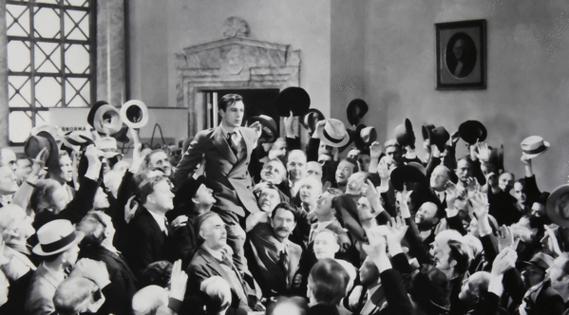Commentary: The Myth of Mr. Smith -- Why moral exhortation doesn't change politics
Published in Op Eds
In the American political conscience, there lingers a myth: That real change comes from exhortation — passionate, unyielding exhortation — that moves the hearts of men and women. According to this story, virtuous citizens advocate relentlessly for what is right until the sheer moral force of their persistence breaks through.
This sentiment is epitomized in the classic film "Mr. Smith Goes to Washington." There, Mr. Smith spends himself on the Senate floor, filibustering without rest, shaming his colleagues, refusing to give up even when all seemed lost. And when victory finally arrives, it arrives not because the people organized and seized their rightful power, nor because of any tactical maneuvering, but because his nemesis, Senator Joseph Paine, unable to bear the lashings of his awakened conscience, succumbs in guilt and confesses defeat. The triumph is moral, almost spiritual: Conscience conquers corruption.
But politics has never worked like that — and it never can or will. In a democracy, power does not hinge on shaming the powerful into decency. It originates from the people and ultimately devolves back to them. The very notion that representatives must be begged, beseeched, or morally harangued to “do the right thing” is a misunderstanding of democracy. A true representative does not sit waiting to be moved by a grand speech or crushed by guilt. They find out what their constituency wants — and they give it to them.
American history is full of examples where moral appeals alone failed to bring about change, and where transformation only came once power shifted on the ground. Take the abolition of slavery.
For decades, abolitionists like William Lloyd Garrison and Frederick Douglass filled the air with fiery speeches and scathing indictments of America’s sin. Their words pricked consciences, but slavery endured. It did not end because southern planters were shamed into repentance. It ended only after decades of political struggle, the rise of a mass anti-slavery party, and finally a civil war that rearranged the balance of power. Moral exhortation lit a fire, yes, of course, but it was power, not guilt, that settled the question.
Or consider the labor movement of the late 19th and early 20th centuries. Workers did not win the eight-hour workday, the weekend, or the right to organize by shaming industrial titans like Andrew Carnegie or J.P. Morgan into sudden pangs of conscience. They won these gains through strikes, boycotts, and the slow building of unions strong enough to demand recognition. When politicians acted, passing the Wagner Act or setting minimum wage laws, it was not because their souls had been stirred by eloquent speeches on the House floor. It was because they faced a mobilized working class that made inaction politically impossible.
Even the civil rights movement, often remembered through the soaring oratory of Martin Luther King Jr., was not, at its core, a triumph of speech over silence. King’s eloquence mattered, but without the Montgomery bus boycott, the sit-ins, the Freedom Rides, and the sheer organizational power of Black churches and student groups, his words would have remained poetry rather than policy. The Civil Rights Act of 1964 was not passed because segregationists had been shamed into decency (in fact, their reaction was the exact opposite: Outrage and a mass migration to Nixon’s camp, where they were called ‘The Silent Majority”); it was passed because mass protest, television coverage, and the fear of escalating unrest forced Congress to act.
History teaches this lesson again and again. Change does not come from the mighty suddenly rediscovering their moral compass. It comes from ordinary people seizing their collective power and leaving the mighty no choice.
In such a system, speeches and shaming aimed at politicians are distractions. Representation is a mirror: What the majority demands, it receives. If the minority is dissatisfied, they have their recourse: to debate, to educate, to persuade — to win real converts rather than to “own” opponents with a meme, a viral video, or a cutting phrase. In other words, the exhortations that matter are the ones between mutually respecting citizens, not the ones aimed at stirring the heart of politicians whose calculus has little room for moral considerations.
"Mr. Smith Goes to Washington" might be viewed as a vision of something better: Politicians who are moral, who can be moved by argument and conscience. But history has proven this to be naïve. Democracy, when it works, does not depend on moral awakenings in the hearts of so-called leaders. It depends on the organized will of the people, expressed clearly and directly, without begging, without shaming, and without illusions.
____
Ahmed Bouzid is the co-founder of The True Representation Movement.
_____
©2025 The Fulcrum. Visit at thefulcrum.us. Distributed by Tribune Content Agency, LLC.
























































Comments